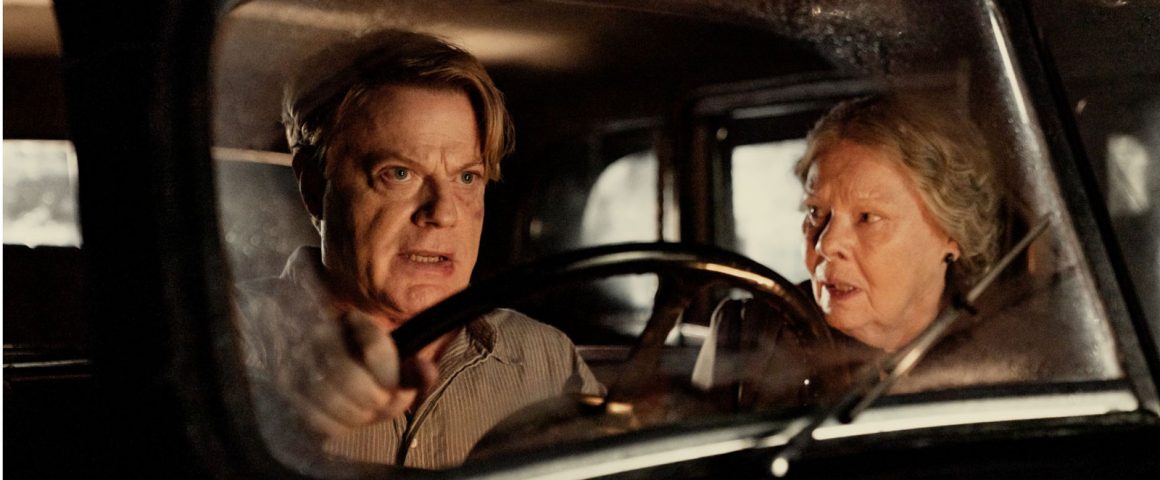Director Andy Goddard’s British war drama, Six Minutes to Midnight, starts off strong — with sweeping tracking shots of the English coast, fitting period attire, and an underlying sense of “doom” matching a continent on the brink of war. In fact, the film’s opening act is quite intriguing — dropping viewers into a peculiar English school for the daughters of Nazi officers in August 1939. The extensive scenery and matching attire only go so far, though, as the film slips into extreme bouts of melodrama and clichés as it labors through its 100-minute runtime.
Goddard, whose TV directing credits include “Carnival Row,” “Altered Carbon,” and “Downton Abbey,” among others, brings a strong lens to a story he co-wrote alongside Celyn Jones and the film’s star, Eddie Izzard (“Victoria and Abdul”). Yet, production values and mesmerizing cinematography aside, the trite script is far from engaging — placing a miscast, and seemingly bulletproof, Izzard in survival situations and making her defy all odds to protect a group of 20 German female students.
The film is set against the backdrop of Hitler’s early aggression in Poland, testing diplomatic patience among Germany’s counterparts. Viewers soon glimpse Augusta-Victoria College, a finishing school in Bexhill-on-Sea, named for a queen with German heritage and operating with an apparent mutual understanding (adoration?) for Nazi Germany. The school’s headmistress, Miss Rocholl (a criminally underused Judi Dench, “Blithe Spirit”) has embraced her role of educating the daughters and goddaughters of prominent Nazi officials. In fact, as they tune into a speech from Hitler on the radio, Rocholl joins in on the Nazi salute. (Aside from a few histrionic scenes, though, she’s effectively missing from Goddard’s work). Further, adjusting to his new role with the school is Thomas Miller (Izzard), a schoolteacher hired to replace a predecessor who’s mysteriously gone missing. Miller stumbles into the role in Bexhill, but appears qualified and well-liked by the students in his first few days.
Unfortunately, Goddard doesn’t let these best beats of the film play out before rushing into a traditional spy thriller narrative — pitting Miller (who has an ulterior motive in Rocholl’s institution) against a German plot to recover the schoolgirls. Miller, who is half-German, is quickly believed to be a Nazi operative/sympathizer, though there’s much more to him than meets the eye.
Izzard carries a majority of Six Minutes to Midnight on her shoulders — though the dynamic falls a bit flat. Still, scenes with Izzard in the classroom or bonding with one of the German girls are fairly admirable, albeit pedestrian. Yet, when Goddard drops the school teacher-turned-operative into marathon sprints away from English law enforcement and introduces one exceedingly generic, gun-toting secret agent after the next, the entire movie slips away. (Chris Seager’s strong cinematography can’t buoy it, either). And through a series of difficult maneuvers, survival tactics and pure wit, Miller is mostly able to evade capture — but his biggest enemy comes from within the halls of Augusta-Victoria . . .
Aside from Izzard and Dench, who is largely a fringe character with little contribution to the film’s most dramatic scenes, Six Minutes to Midnight features a solid turn from Carla Juri (“Brimstone”), who plays Ilse Keller, a German expatriate and lead instructor in Rocholl’s finishing school. Without a doubt, she is the film’s bright spot, though she, too, is handcuffed by a rushed, convoluted script and a production that loses its flair within about 20-minutes.
The main focus of the film — the German girls — is also lost in the murkiness of Miller’s arc, though they hold their own in a handful of scenes alongside their adult costars. Still, the film’s peculiar subject matter (a spy story about 20 young students?) doesn’t seem to translate well for a fast-moving World War II tale and as a result, the girls are nearly forgotten until the plot “thickens” and they’re continually crossing paths with our title character.
If there is a silver lining, it might be Izzard and Goddard’s dedication to the era. It’s clear there is a fascination for the real-life finishing school for German youths. But it would’ve functioned better as an episodic period drama versus an expeditious film with dark tones and scheming spies. Miller masquerading as a school teacher initially piques viewers’ interest, but this facade wears off about as quickly as his cover. Unfortunately, one too many blunders make this period spy flick largely forgettable — though Izzard should be praised for pushing her boundaries in a dramatic role. Perhaps in her next film, the shoe will fit better.



